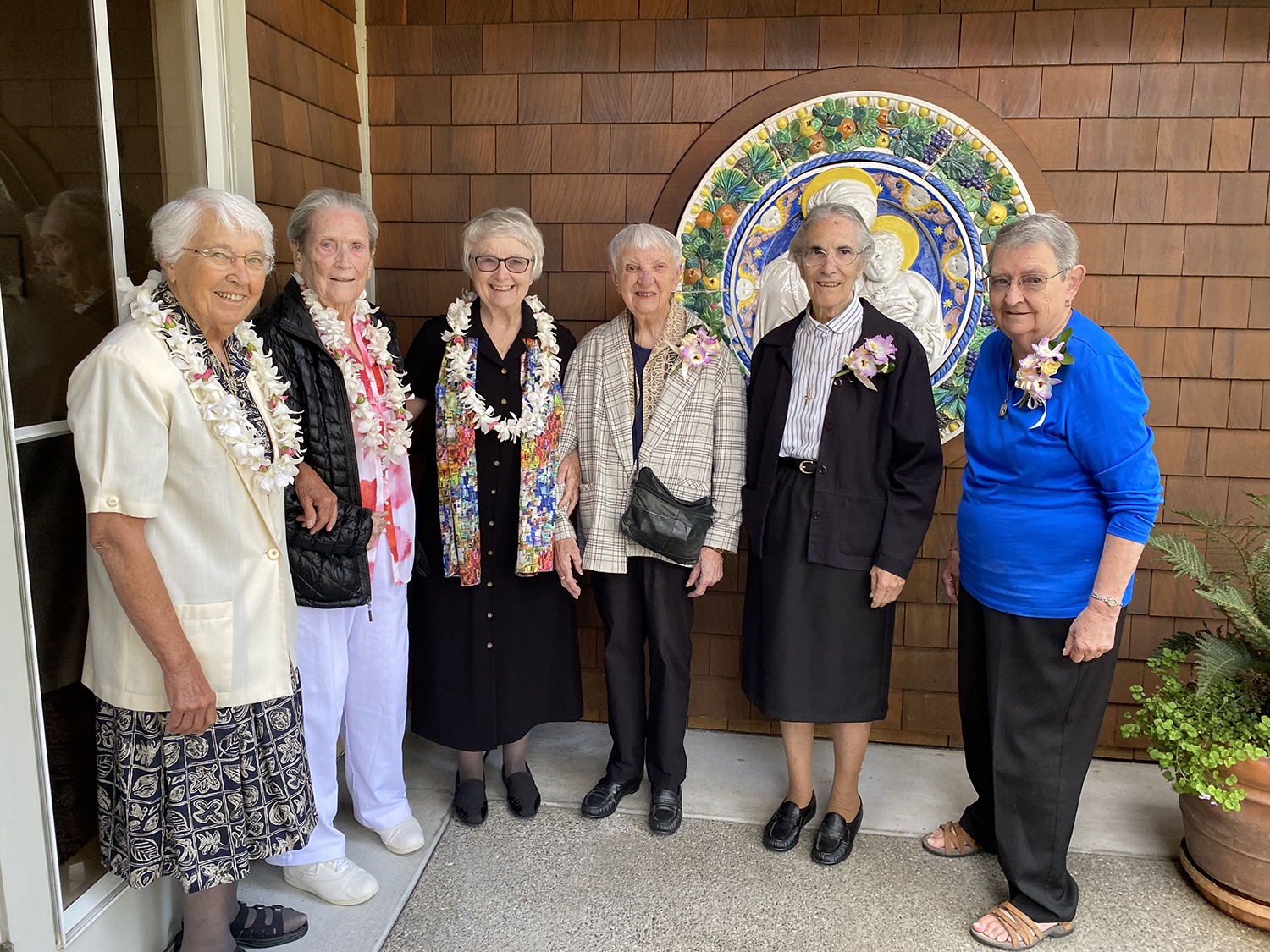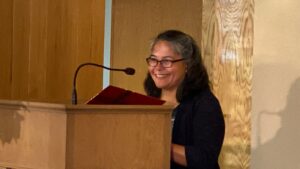- All
- Wisdom
- We Stand on Their Shoulders
- Vocation
- Uncategorized
- Stories Seldom Heard
- Spirituality
- Social Justice
- Prayer
- Peace
- Oneness
- Love
- Letting Go
- Lent
- Joy
- Inspirational Images
- Hope / Healing
- Holy Week
- Gratefulness
- God's Presence
- General News Stories
- Forgiveness
- Finding God
- Faith
- Easter
- Dominican Saints
- Discipleship
- Courage
- Christmas
- Catholic Sisters Week
- Care of the Earth
- Blessing
- Beauty
- Advent
- #justiceOPportunity
Jubilee 2022—A Celebration

The Dominican Sisters of San Rafael gathered to celebrate our Jubilarians in a special liturgy held on July 23 in the Gathering Space in San Rafael. Presiding at Mass was a dear friend to the sisters, Father Michael Fones, OP, and Mass was live-streamed to nearly several hundred guests consisting of family members, friends, sisters from other congregations, and partners in ministry. [Note: scroll to the bottom to find a link to event photos and a video recording.]
 Sr. Christina Atienza, OP offered a special preaching after the Gospel. Her words are shared here:
Sr. Christina Atienza, OP offered a special preaching after the Gospel. Her words are shared here:
Good morning! Today we’re celebrating our twelve jubilarians and Religious life itself. I’d like to share with you my experience and reflections on our way of life both as a relative newbie to it and as a student of Religious life. I have been a Religious for only 10 years, a baby compared to our celebrants. And my studies, as some of you know, have involved a comparison of our way of life as ministerial women Religious with another form of religious life. As I hope to illustrate, there is much to celebrate and also much work ahead for us. To the family and friends who are watching, I hope you’ll get a little more insight into how we live and how you might support and join us not just in our celebration, but also in our work, which I’m sure a lot of you do already.
In these liturgies that we celebrate on special occasions, rather than using the readings from the lectionary, we always get to choose the readings we want. I always look forward see what scripture readings people chose because what we choose are a window into what is dearest to us and how God speaks to us personally. Today’s readings, selected by our jubilarians, capture some of the most beautiful aspects of our lives as Religious. The first reading speaks of being a community of believers of one heart and mind, and of bearing powerful witness to the Resurrection. The responsorial psalm speaks of each person’s intimacy with God. The second reading speaks of being blessed with every spiritual blessing in Christ, including a foretaste of the mystery of God’s loving plan for all of us. And finally, the Gospel, invoking Jesus’ parting words to his friends before he is taken away from them: abide in me, love one another as I have loved you, I chose you to bear fruit that will last. These are the scriptural and spiritual roots of our way of life and they show you how rich it is and how much there is to celebrate in our vocation!
At last year’s jubilee Mass, I had a powerful and more personal experience of what this celebration means. I was sitting right there, next to Cathy deBack, who I always try to sit next to in the jubilee choir because we just have a lot of fun. In between my line of sight to the priest at the altar was Susannah, who was then celebrating her 70th jubilee, and who, over these past ten years has become a dear friend and a great inspiration. When the priest got to the consecration, he raised up the host, I looked at it with love and reverence as I usually do, imagining myself at the Last Supper, beholding Jesus himself, saying to me and to our small gang, “This is my body, which will be given up for you.” After the priest said those powerful words, just under the host, my eyes fixed on the back of Susannah’s head, and suddenly I made the connection. I realized this is what she has been doing, reenacting, for the last 70 years, of HER being consecrated; saying by her interactions with every human being she has ever served and given her loving attention to, “This is my body, which I offer to you.” Now we’ve all heard that we are the hands and feet of Jesus, so what I’m stating may be plainly obvious to you, but for me, that was the first time that that really sunk in. It was so beautiful I couldn’t stop crying. After Mass, I shared why I was so moved with Cathy, who smiled and said, “That happens sometimes.” So, this year, our celebration is that much more meaningful to me for that experience: These twelve sisters, some of whom I am very close to—the seven who are with us and the five who have gone to God, like Susannah, have been the body of Christ for others for, by my count, a combined total of 800 years.
Beyond these wonderfully faithful sisters, at a broader level, we are celebrating Religious Life itself, the lifeform that enables all of us, past, present, and future to continue to bear the Christ light in a particular way through our consecration. Religious life, as we all here know, and for the benefit of our friends and family who are watching, is at an inflection point now. Our numbers are declining. Our ministries have changed from collectives in education, healthcare, and social services to corporate individuals doing diverse kinds of work. The demographics too: entrants now tend to be older, more educated when they enter, and culturally and ethnically more diverse. In other words, the part of the Body of Christ that we embody as consecrated, ministerial women Religious, has been changing radically. Into what, that’s the big question.
The changes are significant and sweeping. I wasn’t here then, but I wonder if it calls to mind the period just after Vatican II, when the body of Religious life morphed into something no one could have ever imagined and into something that some outsiders could barely recognize afterwards. As most of you know from that experience, changes of that magnitude are disorienting and to some, maybe even debilitating. Now, the way of life that became the norm after Vatican II is passing and much of the supports that enabled it to function that way, are needing to be reevaluated because they won’t be needed for much longer. We’re facing another identity crisis, again re-engaging the questions of who we are, what does our way of life mean, and what is our purpose.
Even with experience, big changes don’t feel good while you’re going through them and can elicit anxiety. This time too, it’s not exciting like it was after Vatican II, but more distressing, because it seems like the way of life is disappearing altogether and some of you may feel like you just don’t have the energy for it. Yet now, as then, the body of Religious life, at least as it has existed since the 80s and 90s here in the US, needs to morph. Not just change, but morph. We have the best model for morphing in Jesus himself. From his Incarnation, transfiguration, crucifixion and death, descent into hell, Resurrection, Ascension, to his Presence in the Eucharist and in the Church, the Body of Jesus the Christ kept and keeps morphing, even if the Logos and the Revelation are always the same. The power and the energy to morph, for the sake of witnessing to and making more manifest the Reign of God, is in our DNA because it is part of our vocation. Historically, Religious life has always morphed when it needed to; hence of the birth of our own Order and the mendicants. And now, the world as we know it, our field of ministry, has changed again; so should our witness, so should the fruit that we bear.
Where does our vocation in its present realities intersect with what the world needs? What can we build on to ensure that the new form of Religious life that we’re morphing into together will fledge and thrive? We as a group, along with other women Religious throughout the country, have been pondering this since before I entered and will be continuing to do so for a while longer. Besides our prophetic work that involves addressing the needs of those who are marginalized by our society and our own church, some other aspects of our way of life have emerged that we might consider lifting up to greater visibility. Our unity in diversity is a countercultural response to the polarities of our present times. Our interconnectedness of all Religious and our global sisterhood speak against all forms of tribalism. Our practices of communal discernment, collaboration, and mutuality are a testament to egalitarianism and a democratic form of governance that isn’t ruled by the kind of unbridled competition as we have in American capitalism, but by the principles of sharing our goods and looking out for one another. Those are just a few. All of these have become integral to how we live now, and we may take them for granted for that reason, but maybe it’s time to share more broadly the values that underpin them and our struggles with living them as intensely and authentically as we can.
As I’ve looked more deeply, I’ve come to appreciate how complex we’ve become, both in a positive way, but also in a way that makes the work that much more complicated. We also have no roadmap, as walk by faith. But we are motivated by love, the love that calls us and the love we wish to share, and a vision of the world that is to come, but that is at the same time already here. We have faith, hope, boundless good will, deep communal narratives and traditions, the communion of saints, and one another. And our families, friends, colleagues, and collaborators are here to support us, want us to succeed, are part of us, and are eager to join us. All of us are longing and hoping for a better world.
The mission of Religious life is always the same: to announce, embody, and propagate the Good News of the Reign of God. The Spirit, always one step ahead, morphs it again and again so that it can continue to serve the world that God so loves in the best way possible. Being part of that is something to be celebrated. So, let’s hear it again with hearts, eyes, and ears more open: “It was not you who chose me, but I who chose you and appointed you to go and bear fruit that will remain.” May it continue to be so. Happy Jubilee!
With Grateful Hearts
Thank you to all who Zoomed in, shared messages, and prayed with and for us for making our Jubilee celebration even more special. We are blessed with the presence—virtual and physical—of so many who enrich our lives.
VIEW PHOTOS
https://photos.app.goo.gl/bx3w91zhQC99pWNn8
VIEW VIDEO RECORDING
“Too many of us lack intimacy with the natural world and with our souls, and consequently we are doing untold damage to both.
Read More